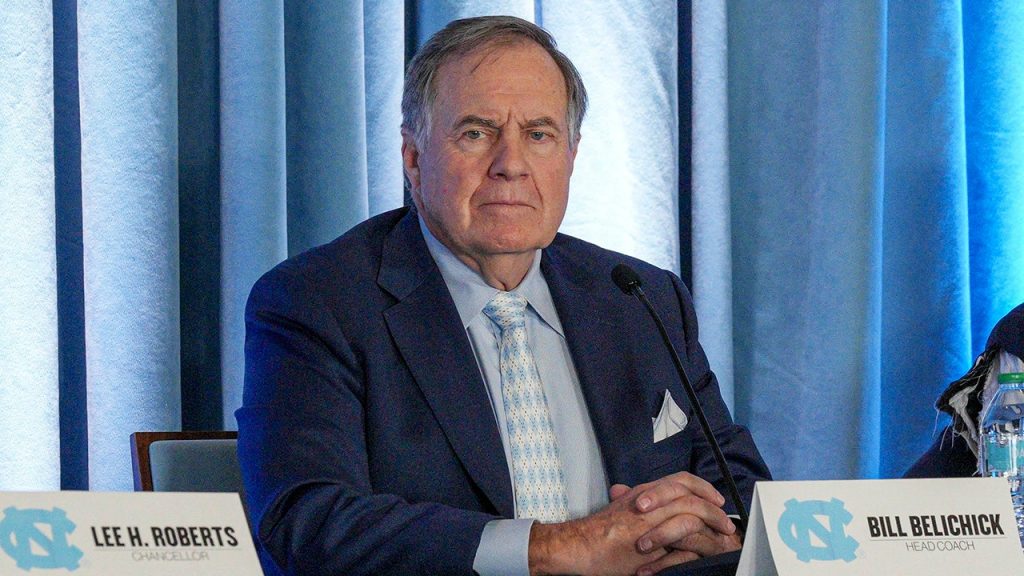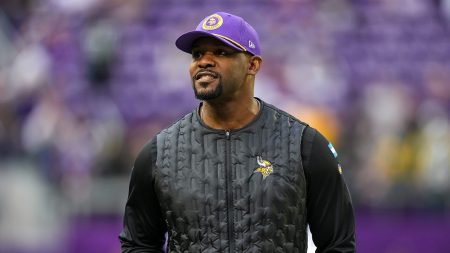The sporting world was thrown into a frenzy when rumors began circulating about legendary NFL coach Bill Belichick’s potential interest in leading the University of North Carolina Tar Heels football program. Speculation swirled for days until the improbable became reality: Belichick, a figure synonymous with professional football, was officially introduced as the Tar Heels’ new head coach. This unprecedented move marks the first foray into college football for the man widely considered one of the greatest NFL coaches of all time.
Belichick’s arrival in Chapel Hill represents a monumental shift in the college football landscape. Having amassed six Super Bowl victories and standing just 27 wins shy of the all-time NFL coaching record, many assumed Belichick’s future, if he chose to continue coaching, lay within the professional ranks. However, the 72-year-old coach surprised everyone by revealing a long-held desire to coach at the collegiate level. He described the opportunity at UNC as a “dream come true,” suggesting a genuine passion for the challenge and a commitment that extends beyond a brief stint before returning to the NFL.
Despite achieving unparalleled success in the NFL, primarily with the New England Patriots, Belichick expressed a deep-seated yearning to experience the unique dynamics of college football. He downplayed his NFL accomplishments, modestly describing them as “good years,” but his record speaks for itself. He built the Patriots into a dynasty, a period of sustained excellence rarely seen in professional sports. Now, he embarks on a new chapter, embracing the distinct challenges and opportunities that college football presents, particularly in the era of Name, Image, and Likeness (NIL) deals.
Belichick’s commitment to UNC appears unwavering. He dispelled any notion of this being a temporary stop-gap before returning to the NFL, emphasizing his intention to build a lasting program in Chapel Hill. While acknowledging the differences between the professional and collegiate levels, he also highlighted the parallels, drawing on his extensive experience to navigate this new terrain. To facilitate a smooth transition and replicate the successful organizational structure he employed in New England, Belichick brought in Michael Lombardi as the team’s general manager. Lombardi’s familiarity with Belichick’s methods and philosophy is expected to foster a collaborative and efficient working relationship.
Belichick’s immediate priorities include assembling a coaching staff and navigating the intricacies of college recruiting, a process vastly different from the NFL draft. He has already begun building his staff, with Freddie Kitchens confirmed as one of the new additions. Furthermore, reports suggest Belichick is keen for UNC to establish robust NIL resources to attract top-tier talent and elevate the program’s competitiveness. His focus on recruiting reflects an understanding of the evolving landscape of college football and the importance of securing elite players to build a winning team.
Belichick’s connection to UNC extends beyond his current role. His father, Steve Belichick, coached with the Tar Heels in the 1950s, imbuing him with an appreciation for the program’s history and the expectations that come with leading it. This personal connection adds another layer of significance to his appointment, fueling his desire to restore the Tar Heels to national prominence. He acknowledges the program’s proud tradition and expresses a strong commitment to reaching the highest levels of college football. His arrival has injected renewed hope and excitement into the UNC fanbase, eager to witness the impact of a legendary coach on their beloved team.










